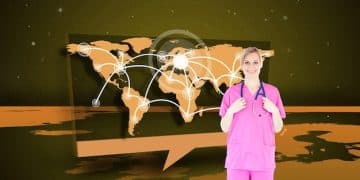Emergency health benefits for displaced persons

Emergency health benefits for displaced persons provide crucial medical access and support, addressing their unique health challenges, including infectious diseases and mental health needs during crises.
Emergency health benefits for displaced persons are crucial lifelines during crises. Have you ever considered how these benefits shape the health landscape for vulnerable communities? Let’s dive into this important topic.
Understanding emergency health benefits
Understanding emergency health benefits is crucial for displaced persons during crises. These benefits provide essential medical services and support, ensuring that vulnerable populations receive the care they need to survive and recover.
What Are Emergency Health Benefits?
Emergency health benefits vary by region, but they generally include access to essential medical care, vaccinations, and mental health services. These benefits are designed to be quickly accessible in times of crisis.
Key Features of Emergency Health Benefits
- Immediate access: Services are available right away when displacement occurs.
- Basic medical care: Treatment for injuries and common illnesses is prioritized.
- Preventative measures: Vaccination campaigns aim to protect vulnerable populations.
Such services are vital for maintaining health and preventing disease outbreaks in crowded conditions. Additionally, emergency health benefits often include nutritional support to combat malnutrition, which is common among displaced individuals.
Access to mental health resources is another essential aspect. Displaced persons frequently experience trauma, and providing psychological support can greatly aid recovery. Programs may offer counseling, group therapy sessions, and stress management workshops.
Beneficiaries of Emergency Health Benefits
The primary beneficiaries of these programs are children, pregnant women, and the elderly. These groups are often the most vulnerable and require immediate attention to prevent health deterioration.
Moreover, non-governmental organizations (NGOs) and humanitarian agencies play a significant role in delivering these services. They work on the ground, coordinating with local health authorities to ensure that the necessary resources reach those in need.
How to access emergency health services
Accessing emergency health services is vital for displaced individuals facing health crises. It can be overwhelming to navigate the available options, especially during chaotic situations.
Finding Emergency Health Services
The first step in accessing these services is knowing where to look. Many countries have designated emergency helplines or local health facilities that provide immediate assistance. Engaging with local NGOs can also be an effective way to find help.
Steps to Access Services
- Identify local resources: Seek out community health centers or mobile clinics offering emergency care.
- Utilize helplines: Most regions have helplines that guide you to the nearest medical facility.
- Work with aid organizations: NGO workers often have updated information on available emergency services.
When in a crisis, knowing whom to contact and where to go is essential. Many displaced individuals may not have access to internet resources. Therefore, relying on word-of-mouth and local networks can be extremely beneficial. If possible, try to establish a robust support network with friends or community members who can share information.
It’s also important to be prepared with personal health information, including any chronic conditions or medications. This information can streamline the process and allow healthcare providers to give proper care faster. Carrying identification, if available, can further assist in the process.
Language Barriers and Cultural Considerations
Language can be a significant barrier for many displaced persons. If you are not fluent in the local language, try to seek assistance from someone who can translate. Some organizations also provide multilingual support, which can simplify communication.
Cultural differences may impact how healthcare is perceived and received. Understanding the local healthcare system’s norms and practices can help individuals feel more comfortable when seeking help. Be open to asking questions and expressing concerns to ensure you receive the care needed.
Key health challenges faced by displaced persons

Displaced persons face numerous health challenges that can severely impact their well-being. These challenges often arise from inadequate living conditions and limited access to essential services. Understanding these key health issues is crucial for developing effective support strategies.
Common Health Challenges
Among the most pressing challenges are infectious diseases, mental health issues, and lack of access to clean water. Displaced populations often live in crowded environments, making it easy for diseases to spread. Additionally, the stress of displacement can lead to various mental health problems.
Infectious Diseases
- Respiratory infections: Common in overcrowded shelters where hygiene may be poor.
- Gastrointestinal diseases: Often caused by contaminated water and inadequate sanitation.
- Vaccination shortages: Risk of outbreaks increases when vaccinations are not readily available.
The lack of preventative health measures exacerbates the spread of these diseases. While organizations may provide emergency services, long-term health solutions remain essential. Education around hygiene practices can help reduce infection rates.
Mental health challenges cannot be overlooked either. Displacement can lead to anxiety, depression, and post-traumatic stress disorder (PTSD). Many individuals may have witnessed traumatic events during their displacement, resulting in psychological distress. Access to mental health services is vital, yet often limited.
Access to Clean Water
Access to clean water is another significant health challenge. Many displaced persons rely on temporary sources that may be unsafe. Contaminated water can lead to serious health issues, including cholera and dehydration. Ensuring that displaced populations have access to safe drinking water is crucial in preventing health crises.
In summary, the key health challenges faced by displaced persons, such as infectious diseases, mental health issues, and access to clean water, highlight the importance of targeted health interventions. Addressing these challenges effectively can significantly improve the quality of life for those affected.
Role of organizations in providing health care
The role of organizations in providing health care for displaced persons is crucial. Many humanitarian groups work tirelessly to deliver essential services to those in need. Their efforts help bridge the gap when local health systems are overwhelmed or non-existent.
Types of Organizations Involved
Many types of organizations provide health care to displaced persons. These include international NGOs, local charities, and governmental bodies. Each plays a unique role in ensuring access to critical health services.
Key Functions of Health Organizations
- Emergency medical care: Organizations often set up clinics to provide immediate treatment for injuries and ailments.
- Vaccination programs: Many groups run vaccination campaigns to prevent outbreaks of diseases.
- Mental health support: Psychological services are provided to help individuals cope with trauma.
Through these functions, organizations can address both physical and mental health needs. They often collaborate with local health authorities to combine resources and mitigate challenges in care delivery.
Additionally, organizations engage in health education, teaching displaced persons about nutrition, hygiene, and disease prevention. This knowledge empowers individuals to take care of their health and that of their families.
Community Involvement
Some organizations also encourage community involvement in their programs. By training local volunteers, they can extend their reach and foster a sense of ownership among displaced persons. Local involvement leads to improved trust and effectiveness in service delivery.
Furthermore, these organizations often help facilitate communication between displaced persons and local health services. This connection is essential for continuity of care as individuals transition from emergency situations to stabilization.
Real-life stories of displaced individuals
Real-life stories of displaced individuals illustrate the profound impact of displacement on health and well-being. These narratives highlight the human side of crises and the resilience shown by those affected.
Stories of Resilience
Many displaced persons have faced unimaginable hardships yet continue to persevere. For instance, a mother fleeing conflict with her children may endure a long journey, often living in makeshift shelters. Despite limited resources, she finds ways to care for her family’s health and maintain hope for a better future.
Community Support
Some displaced individuals share how community support has made a difference. They often lean on one another for emotional and practical help. It’s not uncommon for neighbors to share food, healthcare tips, or even medical resources, creating a tight-knit community.
- Shared experiences: Many find comfort in knowing they are not alone.
- Mutual aid: Individuals often pool resources to access health care services.
- Strength in numbers: Together, they can advocate for their rights.
These stories emphasize the importance of community in overcoming challenges. Healthcare providers often listen to these accounts to better understand the needs of displaced individuals.
In one touching example, a young man who lost his family during displacement shared his journey of finding hope through community organizations. With their support, he accessed psychological services, which played a vital role in his healing process.
Voices of the Displaced
These real-life accounts reveal the complexities of displacement. Each story offers unique insights into the emotional and physical struggles faced daily. By elevating their voices, we can understand the urgency of providing better health services and support.
As organizations work to provide aid, hearing these personal narratives ensures that care is tailored to meet the specific needs of those affected. Every story represents a call to action for improved emergency health benefits and resources for displaced persons.
In conclusion, understanding the health challenges faced by displaced persons is essential for improving their well-being. Organizations play a vital role in providing emergency health benefits, ensuring access to care, and supporting the community. By sharing real-life stories, we can find inspiration and strength in the resilience of those affected. As we continue to advocate for better health services, it’s crucial to remember the importance of human connection and support in overcoming adversity.
FAQ – Frequently Asked Questions about Emergency Health Benefits for Displaced Persons
What are emergency health benefits?
Emergency health benefits provide essential medical services and support to displaced persons during crises.
How can displaced persons access healthcare services?
They can locate services by contacting local healthcare facilities, using emergency helplines, or seeking help from NGOs.
What challenges do displaced individuals face regarding health?
Displaced individuals often face issues such as infectious diseases, mental health struggles, and lack of access to clean water.
How do organizations help displaced persons?
Organizations provide crucial health services, support mental health programs, and educate communities on health practices.





